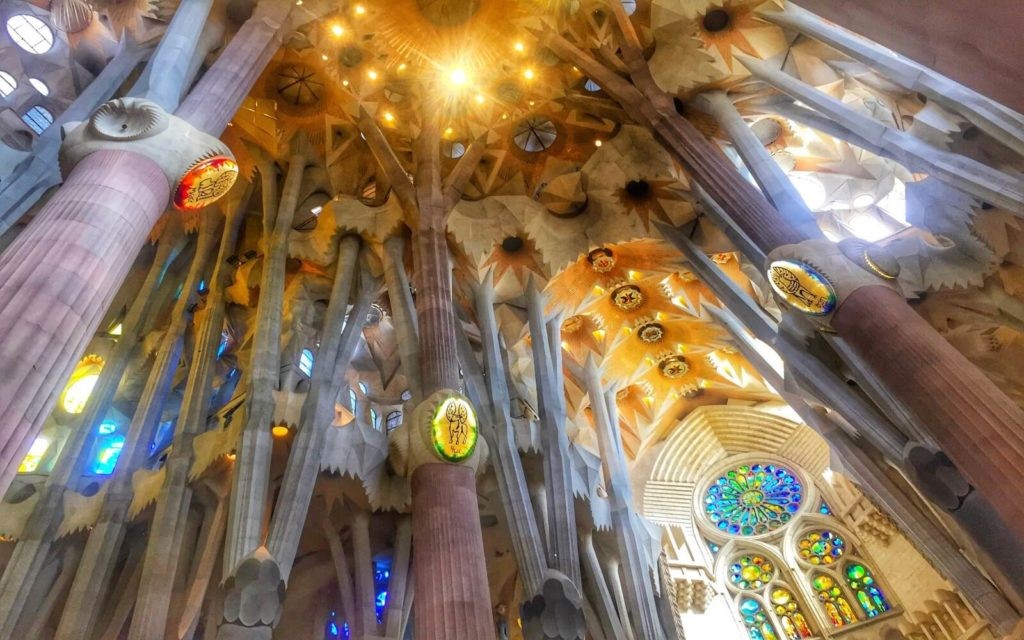PHOTO: Sagrada Familia (Barcelona)
– Rev José Mario O Mandía
The five ways of Saint Thomas conclude respectively as follows:
(1) First Way: Unmoved Mover and Pure Act
(2) Second Way: the First Efficient Cause
(3) Third Way: the Necessarily Existing Being
(4) Fourth Way: Perfect Truth, Goodness and Beauty
(5) Fifth Way: Supreme Governing Intelligence.
Saint Thomas explains that each one of these conclusions describes the one we call “God.” Furthermore, all five can be summed up in Saint Thomas’ statement that God is “Ipsum Esse Subsistens” (“The Self-Subsisting Act of Being”) (Summa Theologiae I q4 a2). God is Pure Act of Being, He is Being Itself. This philosophical conclusion perfectly coincides with the supernatural revelation by God of his name to Moses. We will recall that in Exodus (3:13-14) Moses asked God what His name was, and he answered, “I Am Who Am,” “I am Being Itself” (in Hebrew, “YHWH” — the name is written without the vowels out of respect for His name).
From the fact that God is Pure Act of Being, we can infer many of the divine attributes. We had studied earlier the concepts of act and potency (see Bite-Size Philosophy 29). Now, there is an important characteristic of the relationship between potency and act which is that potency limits an act. Let me try to illustrate this with a simple example. Let us take two students who have a potency (potential) to learn physics. What each of them actually learns will depend on each one’s real capacity. The actualization depends on and is limited by the potency. So the concept of “potency” also implies a “limit.”
Now let us apply that to God. The conclusion that God is Pure Act means that there is no potency in Him — there is nothing that limits Him. The fact that God is Pure Act implies that He is infinite. Since He is infinite, He cannot be measured. He is not limited neither by space nor time.
God is not limited by space. He is everywhere. He is not restricted to be here or there or in any specific place. One reason is that He is spiritual. Only material beings are restricted to one place. But another reason God is everywhere is that He is Being and so where there is being (even among spiritual beings such as the angels), his influence is present.
God is not limited by time. Time, according to Aristotle is numerus motus secundum prius et posterius (“the measure of motion/change according to a ‘before’ and ‘after’”). Recall that “motion” or “change” is the passage from potency to act. But God is Pure Act. Therefore, there is no motion or change in God. If there is no motion or change, there is nothing to measure. God is not limited by time — He is eternal.
Moreover, in Aristotle’s thought, act is the same as perfection. So if God is Pure Act, then he is Pure Perfection, Infinite Perfection. This is confirmed by the fourth way (inspired by Plato) which concludes that He is Supreme Truth, Goodness, Beauty.
The conclusion of the fifth way is that there is a Supreme Governing Intelligence. Thus we are not talking of an impersonal God, but a God who is all-knowing, all-loving and all-powerful.
Now we can see up to what point philosophy can lead us in the search for the ultimate “why.”
However, faith has more to reveal to us, because it teaches us that that God is Father and wants us to call him so. But that’s beyond philosophy and that’s what we will tackle in the next series: Bite-Size Theology.


 Follow
Follow


